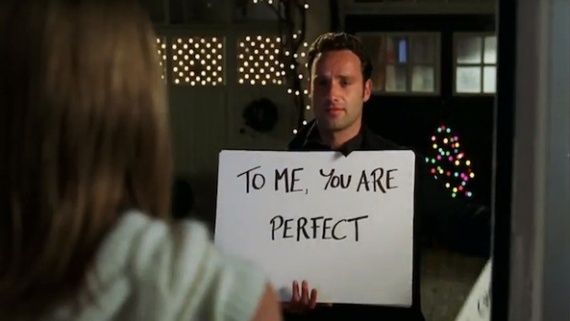Ah, it's that time of year again: the ambiguous void that fills the time between the much-anticipated December 25th and the much-regretted December 31st. It's a time for self-reflection, for sharing with family and friends, and for bingeing corny romantic comedies while sipping a cup of tea and wishing that the next year will bring you your own version of Hugh Grant in Love, Actually (2003), beaming in appreciation of your little annoyingly cute quirks and thrusting his pelvis with perfect swagger (British accent preferred, but not required).
The amount of romantic comedies that flood cable television during the holidays induces the kind of sugar rush you get from overdosing on a combo of Betty Crocker icing-smothered gingerbread cookies and that hot chocolate you "accidentally" spiked with peppermint schnapps: sickening but too good to turn away. You may know they're bad for you - for your expectations of the world, for instilling the notion of the "happy ending" in a world with a 50 percent divorce rate - but you stay glued to the television, swept up in the twee optimism of a universe in which the only thing that matters is that two people, against all odds, end up together.
The notion of the classic romantic comedy may be outdated; after all, we're living during the reign of Lena Dunham and Master of None and They Came Together (2014), David Wain's hilarious send-up of Nora Ephron-esque rom-com tropes (watch it!) However, it remains one of the strongest genres filmmakers rely on to bring audiences into theatres when they need it most. Just this year, there's been Trainwreck, Man Up, The Duff, Aloha, Sleeping with Other People, and Playing it Cool - not like those compare to the golden age of rom-coms, which brought us 10 Things I Hate About You (1999), Bridget Jones's Diary (2001), Along Came Polly (2004), and 27 Dresses (2008). While each of their premises varies, they all revolve around the same basic plot structure: the setup, the meet-cute, the complication, the midpoint, the crisis, and finally, the resolution. AKA, boy meets girl, boy chases girl (or sometimes vice versa), boy and girl fall in love, and eventually, after some arguments, they make up with a smooch and some grand pronouncement of their love for one another ("I love that you get cold when it's 71 degrees out, I love that it takes you an hour and a half to order a sandwich..." - who doesn't love 1989's When Harry Met Sally?)
In this era of peak skepticism, when Christmas is more about our obsession with stuff we don't need and big bows and pretty lights than its religious significance, and about 23 percent of the American population does not identify with a specific religion according to the Pew Research Center, why do mythological romantic tales resonate so much? Why do people remain faithful to these narratives that depart from our lived experiences, when so many people are choosing to buck tradition?
Like store-bought icing, romantic comedies could be described merely as guilty pleasures. But I think there's something more powerful that lies beneath the artificial chemistry between the klutzy yet always stunning every-girl and the hunky love interest. There's the familiarity of it all, one that reminds you that everything will work out, even though you moved to New York and your job doesn't pay enough money to sustain your rent and your love of artisanal dark chocolate. There's the delusion that there's such thing as the one, and that they're just waiting around the corner in Central Park or the local independent bookstore. There's the golden lie that all problems in a relationship can be resolved with some flowers, a flash mob, and a dragged-out kiss. And of course, there's the enduring power of Hollywood's white, upper-middle class, sanitized version of reality.
There's also the enduring power of two, of a unity that develops from some irrational desire to spend more time with someone you barely know. Though it rarely follows the formula we see repeated over and over onscreen, the power of two remains one of the most mystifying, confusing, troubling, heart-pounding forces known to the human race. And if we can't bring ourselves to have faith in a greater power than that, we can at least revel in the spirit of interpersonal connection.
So on the eve of 2016, if you didn't share a smooch with your Hugh Grant or your best friend turned out to in fact be no more than a friend, there's no shame in flipping the channel to Lifetime - you can always live vicariously through Katherine Heigl.
